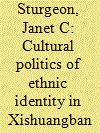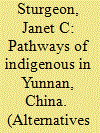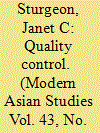| Srl | Item |
| 1 |
ID:
118422


|
|
|
| 2 |
ID:
076461


|
|
|
| 3 |
ID:
089384


|
|
|
|
|
| Publication |
2009.
|
| Summary/Abstract |
First authorised in 1987, local village elections in China have been much studied by China scholars to assess the emergence of democracy in the People's Republic. Elected village committees were to manage 'local affairs', including village lands, as a step towards local self-governance. In place of democracy, this article highlights access and control over natural resources in relation to a local village election first held in Mengsong village, Yunnan, in 2000. A comparison of resource access in 1997 and 2002 shows that over this period, Mengsong villagers lost access to forests, agricultural lands, pastures and mineral resources-'local affairs' that an elected committee might have managed. National and local events from 1998 to 2002 signalled a recalibration of people of high and low 'quality' (suzhi) in China, with Mengsong shifting cultivators emerging as 'low quality' people who threatened China's environment and economic development. These changes in status signified a dramatic shift in who was qualified to manage resources, run local affairs and contribute to China as it entered the World Trade Organisation (WTO) in 2001. The discourse of 'quality' resulted in Akha farmers being blamed, and blaming themselves, for their own poverty and resource loss, deflecting attention from the political economic processes that caused their dispossession. Far from the emergence of democracy, the local village election in Mengsong entailed increased state control over people and resources, as China geared up for environmental protection and engagement with the global economy.
|
|
|
|
|
|
|
|
|
|
|
|
|
|
|
|